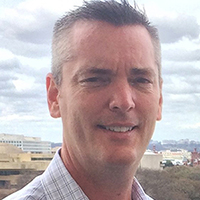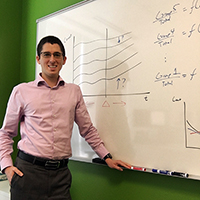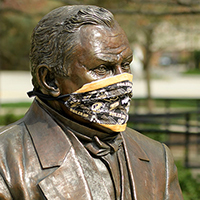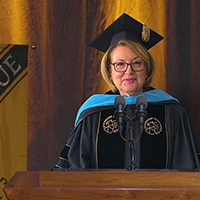I chose to be an officer in military intelligence in the United States Army Security Agency (USASA), which required additional training at Fort Devens, Massachusetts, to become an electronics intelligence officer. The only available position was in the 502nd USASA Group, located in Augsburg, Germany (not a bad posting for a trained German linguist). I received orders to report to the 201st Communications Security Company (COMSEC). I was initially assigned the responsibility for managing classified documents, which again required training necessary to achieve the clearance level required for managing and handling (i.e., courier) classified documents of the 502nd USASA Group. This training took place in Bavaria amid the beautiful hills and mountains of southern Germany.
Overall, the first two-and-a-half years of my military experience (August 1970 to February 1973) was spent in various training programs, meeting and making friends in each program.
Once I began to work, I quickly became known for my ability to put out fires through gaining the trust and confidence of those under my command, understanding the decision processes, identifying where problems and bottlenecks occurred, and re-organizing to minimize or eliminate them.
During this time, I became aware that Vietnam was winding down, and as a result, some good officers were being riffed (REFRAD - Reduction in Force). I wrote a letter that went up the chain of command requesting that I be permitted early discharge, allowing a good officer who, otherwise would have been riffed, an opportunity to remain in service.
Just prior to leaving the 502nd, the group commander told me, “Plante, you are going to make a lot of money.” My response was, “No, I plan to become a teacher.” I was honorably discharged in August 1974, completing my initial commitment to four years of military service.
My PhD
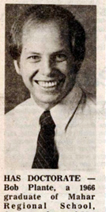 The state of Massachusetts was granting free tuition to residents who were Vietnam era veterans to attend the University of Massachusetts. This, along with ample funding from the GI Bill providing the necessary resources and having no family responsibilities, convinced me to go after an MBA. A major called management science (better known today as business analytics) allowed me to couple my BS in Physics with the leadership skills that I had learned as a military officer. I entered UMass at Amherst in the fall semester of 1976. I got straight A's in my first year, but I would never complete the MBA.
The state of Massachusetts was granting free tuition to residents who were Vietnam era veterans to attend the University of Massachusetts. This, along with ample funding from the GI Bill providing the necessary resources and having no family responsibilities, convinced me to go after an MBA. A major called management science (better known today as business analytics) allowed me to couple my BS in Physics with the leadership skills that I had learned as a military officer. I entered UMass at Amherst in the fall semester of 1976. I got straight A's in my first year, but I would never complete the MBA.
During the winter months, I would ski whenever I had the chance and while on one trip to Okemo Mountain, Vermont, I happened to share a ski lift ride. The usual small talk ensued; I mentioned that I was pursuing an MBA, taking advantage of the GI Bill. Surprisingly, he mentioned that he had been watching me ski and he very much liked what he had seen. I shared with him that I had learned much of my ski technique in Switzerland. While on duty with the 502nd ASA Group in Augsburg, Germany, a friend and I had spent a week in the Swiss Alps attending a weeklong ski clinic where I had learned a new ski technique called the Epping turn. He suggested that I should temporarily forestall the pursuit of my MBA and consider being a ski instructor.
Well, this piqued my interest and I asked if he had any contacts that could make this happen. He turned to me and said that I need not go any further because he was the head ski instructor at Killington, Vermont, and the job was mine if I was so inclined. While I was seriously pondering that offer, I was approached by a faculty member whose classes in management science I had taken. These were tough classes and he was impressed by my keen interest in the subject. He was leaving UMass, having been offered a position at the University of Georgia that would begin in August 1977. He had been given the option of bringing along with him two promising students for their PhD program.
One has to understand that I had enjoyed my undergraduate days very much, playing sports and attending weekend frat parties at the expense of a GPA that would never qualify me for entrance into a PhD program. Here it had just been handed to me. I did not dwell any further on the benefits of a ski instructor's life.
I chose the PhD, and I was in and gone. I spent the summer taking a few courses at UMass that would count toward required credits in the PhD program. Come that fall, packing all of our belongings into a rental truck, hitching my car to the truck, and followed by the faculty member and another student and his wife, our little caravan drove straight through to Georgia, stopping off for a couple of siestas along the way. We were on our way to our future together full of enthusiasm and impatient to begin.
 Athens, Georgia... The SEC… Augusta… The Masters… Atlanta… Oh, what stories to tell here? Suffice to say, I rented a tin roof shack on a 300-acre North Georgia farm for $100 per month and a promise to help in the haying season. Well, I earned the PhD in three years, was offered and chose to accept a faculty position at Purdue University. And in August 1980, I packed my belongings into a Ryder Truck Rental, hitching my car to the rental, and saying my goodbyes, I was off to the Big Ten, where my life would undergo a major step up when I met my wife, Jeanie. Thus, ending my path to Purdue, where I have been inspired and humbled in the presence of genius. I will leave it to others to assess and review my time at Purdue and the Krannert School.
Athens, Georgia... The SEC… Augusta… The Masters… Atlanta… Oh, what stories to tell here? Suffice to say, I rented a tin roof shack on a 300-acre North Georgia farm for $100 per month and a promise to help in the haying season. Well, I earned the PhD in three years, was offered and chose to accept a faculty position at Purdue University. And in August 1980, I packed my belongings into a Ryder Truck Rental, hitching my car to the rental, and saying my goodbyes, I was off to the Big Ten, where my life would undergo a major step up when I met my wife, Jeanie. Thus, ending my path to Purdue, where I have been inspired and humbled in the presence of genius. I will leave it to others to assess and review my time at Purdue and the Krannert School.
Related: Bob Plante retires following four decades at the Krannert School

